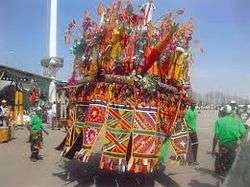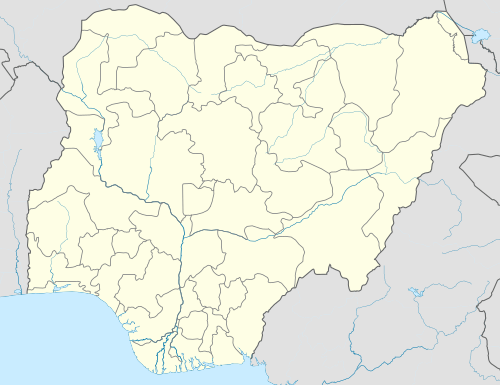Umuleri
| (Umueri) (Okebo) | |
|---|---|
 Umueri land | |
| Nickname(s): Umueri Ovuakwu (Oke-ebo City) | |
 (Umueri) Location in Nigeria | |
| Coordinates: 6°19′N 7°52′E / 6.317°N 7.867°E | |
| Country | Nigeria |
| State | Anambra |
| LGA | Anambra East |
| Government | |
| • King |
Eze (His Royal Highness) Late Nelson U. Okoye (Igwe Okebo 1 of Umueri). (His Royal Majesty) Igwe Benneth Izuchukwu Emeka JP, Oke-ebo II of Umueri [1] |
| Population (2015) | |
| • Total | 1,500,000 |
| • Ethnicity | Igbo 99% |
| • Religion | Christianity, Odinani |
| Time zone | UTC+1 (WAT) |
Umueri also known and pronounced as Umuleri is an ancient town in Anambra State of Southeastern Nigeria. The people of Umueri town belong to an Igbo ethnic group and has an estimated population of 342,000.00[2] It's located within the Anambra Valley, bordered by Anambra River (Omabala River) and Anam communities in the north, Nteje to the south, Aguleri and Nando in the east and Nsugbe in the western flank.
It was the oldest human settlement established by early Igbo founders. According to earliest scholars like GT Basdon “ it was part of the earliest human settlement, east of the Niger.”. This much was agreed by other Historians such as Prof Elizabeth Isichei who concurred that Anambra Valley was indeed the first area of human existence
History
The origin of Umueri is surrounded by myths and legends as in other communities. There are various accounts of her origin. However, the natives of the town believe on the oral tradition that their clan was founded by Children of a man named Eri. The Oral tradition passed from generation to generation indicates that Umueri ancestors are group of migrating clan from an unknown place, though of late research on their habitats, cultural practices and artifacts they left behind suggests a connection with the fleeing Israelites of post Exodus era. The Settlers that infiltrated into the land settled at a place called Eri-aka and founded a clan called “Umueri” . Though the exact date, that they settled on the land was not known, many scholars were of view that it occurred around 940AD
Division and administration
Traditionally, Umueri is broadly divided into 3 clans: Ezi, Ikenga, Ivite. The clans are further divided into villages and sub-villages. But with advent of colonialism and modernization, the town has consciously grown and governed just like other Igbo Communities . The three traditional clans of Umueri are written down below with their corresponding Villages:
- Ezi: Belongs to Nneyi Village which is also divided into further sub-villages
- Ikenga: Comprises Ugume, Umudiana, Umunchezi, etc.
- Ivite: Umuatuolu, Ogbu and Mgbede
The pre-colonial Umueri government was a republican but with influence of Bini Kingdom in that part of Igboland, it changes to Monarchical in nature in which the Eze resided in Ivite. The Prime Minister (Onowu) & Ajie in Ikenga and Ezi respectively. Modern administration since colonization relegated this system and enthroned the Igwe Dynasty which is prevalent Institution till date.
The Igwe dynasty has come to stay including but not limited to the performance of basic traditional rites. The Ofala festival is traditionally performed by one who holds the Title of Oke-ebo, the traditional ruler. The New Yam festival is performed by the Onowu, Ajie and ``Igwe Oke-ebo``
Below is the Structure of Present Umueri Administration:
- Igwe in-Council - The Traditional Ruler and his Cabinet[Igwe Cabinet]
- Council of Elders [Ndichie] - The Elders of the Community
- Umuotu - An Elite Age Grade that helps in implementing laws in the Community
- Town Union - Umueri General Assembly [UGA]
- Policing Age Grade - An Age grade in charge for enforcement of local laws made in the town
- Sanitation Age Grade- An Age Group in charge of clearing and maintenance of rural road, Village Square and of all Public Utilities
Religion
Prior to the coming of Europeans, Umueri people practiced traditional religion with the worship of various deities. However, they had since embraced Christianity about a century ago. Today, there are more than 85% Christians in the town. The major Christian faiths are the Catholic and Anglican denominations.
Some other churches, especially of the Pentecostal faith, have emerged in Umueri in the past fifty years. The town is also referred to as a pinnacle of Anglican evangelism as it has one of the oldest churches east of the Niger. Churches that are bound in the town include and not limited to the following: St Immanuel Anglican Church (founded 1904), St Gabriel Anglican Church (1912), Our Lady of Victory Catholic Church (1975), St Marks Catholic Church Nneyi etc.
Natural Resources
Umueri(Umuleri) is blessed with natural resources like
- Petroleum
- Aluminium
- Uranium
- Clay
- Coal
- Fertile Soil for farming
- Natural Reserve Forests
Infrastructure
Most of the public basic infrastructure in the town is built by the community. The community-built infrastructures are as follow: Umueri General Hospital, Umueri Town Hall, Recreation Club House, Umueri Girls High School, Ugume Umueri, Umueri High School, Obinetiti (formerly Umueri Technical College), Community Secondary School, Umuatuolu, Umueri Development School, Nneyi, Umueri Postal Agency, Umueri Community Bank, Afiama Market, Eke Market, Nkwo Nneyi Market, etc.
The few infrastructure owned by government includes the following: Umueri Nomadi School at Umudiana-Umueri, Local Government Secretariat, Otuocha High Court, Umueri Head Bridge, Umueri Civic Center, Umueri Library and Skill Acquisition Center, Boreholes Projects sunk around the Villages and proposed and ongoing projects which includes the Orient Refinery, Anambra State Umueri Cargo Airport, Orient Low Staff Residential Quarters etc.
References
- ↑ Umuleri, Gulf. "Umuleri the Cradle of Igbo Race". umueriland.com. Retrieved 2 February 2017.
- ↑ Nwabunwanne, Ifediora Christopher. Anambra Day Break Series.
- Tochukwu Henry "Incipience of Migration"
- Nwabunwanne Ifediorah Christopher. “Umueri Head of Ancient Umueri Clan”
- Nwabunwanne Ifediorah Christopher. "Anambra Day Break Series"
- Tochukwu Henry Chidebelu. "The Abode Series"
- Isichei Elizabeth. “A History of Igbo People” (London, ENGLAND: MacMillan, 1976.)
- Patrick Chidalu Chukwuma. "The Okebo City of Nigeria"
- Patrick Chidalu Chukwuma. "Okebo City Portal" (Bachelor Computer Science, University of Wollongong Australia )
uyanwa chibuzor p.son of amaechi uyanwa
playing at puma fc, in lagos state nigeria awarded the player of the year in year 2017 (foothball)